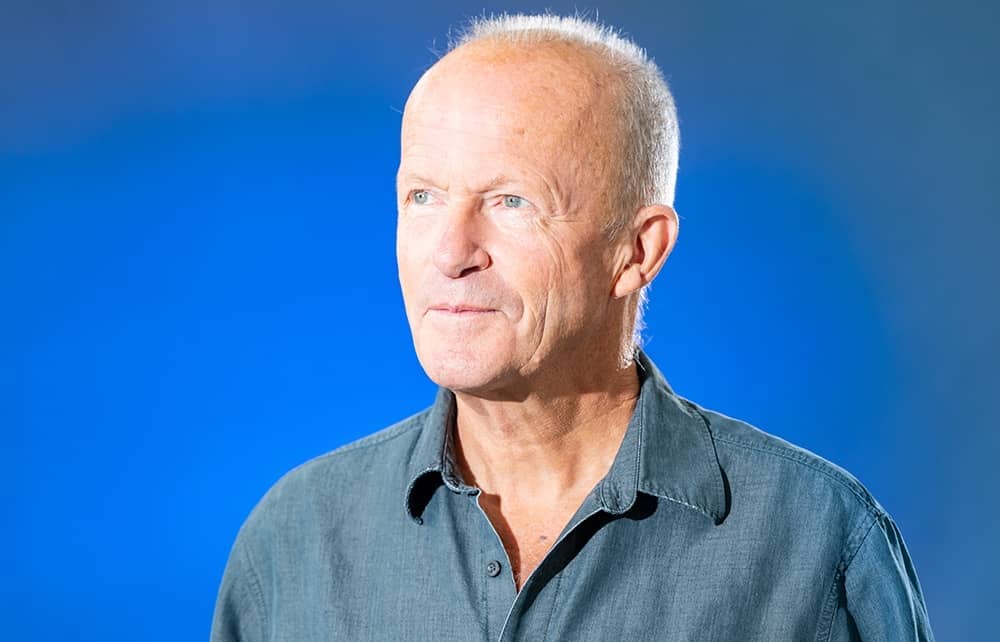Since announcing his retirement in 2013, Jim Crace has had more comebacks than Kanye West, something for which we should all be thankful. Craceland is a compelling place to visit, full of hazy yet broadly recognisable locations (Tudoresque England in the IMPAC award winning Harvest; a vaguely Mediterranean town in Melody) and spanning indeterminate times (the post-apocalyptic future in The Pesthouse; the end of the Stone Age in The Gift of Stones). The specific non-specificity of his fiction reflects Crace’s view of himself as more of a storyteller than a novelist, and his sense of history as a largely unwritten – and therefore often forgotten – phenomenon.
In this, eden is typical Cracian fare. The book is set in paradise, or something like it, years after Adam and Eve’s fall. The apple trees are still there, now tended by 50 or so gardeners, as well as a nuttery, stock ponds and fields. There are also angels, human-sized and covered in blue feathers, who must look a bit like Big Bird from Sesame Street.
There are human-sized angels, covered in blue feathers, who must look a bit like Big Bird from Sesame Street
Life in eden doesn’t sound very paradisal. The gardeners are obliged to fast regularly and mustn’t pick fruit from the trees – instead they should let it fall ‘in the lord’s good time’, like frustrated fruitarians. God, if he even exists, communicates his whims via the angels and their ‘go-between’, a bitter, self-loathing gardener named Alum. The lord is also a bit of a micromanager, with ‘a bell for everything, from quarters to alarms, and somebody to ring it’.
This makes it easier to understand why the gardeners might be envious of those who live beyond the wall. Though they age and die, these mortals are also able to love and have children. With suffering comes hope. When one of the gardeners, a woman named Tabi, is driven to escape to the world outside, her companion, Ebon, along with an angel named Jamin, decide to follow her.
‘The real tradition of oral storytelling’, Crace said in an interview in 2005, ‘is all about rhythm and about hitting percussive notes, and changing the notation of prose.’ In eden the percussive notes are those of a kind of Miltonic free indirect style, in which the blank verse is always threatening to burst through: ‘It’s said – ordained, in fact – that angels cannot hate’; ‘Brief life is all they have out there, the sermonising master says.’ This sometimes makes it difficult to read beyond the rhythm. I often had to double back to get the sense of a paragraph, having been lulled the first time round by Crace giving it the big iamb.
His puckish, biblical world-making extends to the names of trees and creatures, which are conjured up just by being named. Thus, along with anachronisms such as ‘freshly minted’ and ‘brevet’, we get ‘bellygills’ swimming among the eels and carp, and ‘tarbonies’ – trees that only exist in Crace’s fiction – lining the edges of the garden. Like the fake epigraph with which eden begins (‘Regard the Angels and their glisten’d Wings; Behold their flightless underlings At labour in the fields’), the point of these plausible faked details seems to be that they gesture towards another, parallel world in which such things might once have existed.
Despite describing himself as a ‘North Korean style atheist’, religious themes are nothing new for Crace. Nor is the ambiguity with which he treats them here, which is likely to infuriate believers and unbelievers equally. His real interest, however, isn’t theological but moral, and eden isn’t about God at all. Instead, it’s about how stories are a direct result of our mortality, endlessly recyclable and reinterpretable. ‘This is what the world’s about,’ Tabi concludes: ‘It’s wondering and stories.’






Comments